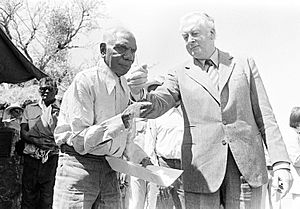Wave Hill walk-off facts for kids
The Wave Hill walk-off, also known as the Gurindji strike, was a very important event in Australian history. It started on 23 August 1966, when about 200 Gurindji people, including stockmen and their families, walked off their jobs. They worked at Wave Hill, a large cattle farm in a place called Kalkarindji in the Northern Territory, Australia. This protest was led by a brave Gurindji man named Vincent Lingiari.
At first, people thought the Gurindji were protesting against their poor working conditions and low pay. But soon, it became clear that their main reason was much bigger. They wanted their traditional lands back. These lands, which belonged to the Gurindji people for thousands of years, covered a huge area of about 3,250 square kilometres before European settlers arrived. The walk-off lasted for about nine years, showing how determined the Gurindji people were.
Contents
A Fight for Land Rights
The Gurindji people's main goal was to get their land back. This was a big step in the fight for Aboriginal land rights in Australia. Land rights mean that Indigenous Australians have the right to own and control their traditional lands. For a long time, their lands were taken without their permission.
The Whitlam Government Steps In
The walk-off continued until the Whitlam government was in power. Gough Whitlam was the Prime Minister of Australia from 1972 to 1975. He understood the importance of the Gurindji's demands. On 16 August 1975, after talking with the owners of the cattle farm, Prime Minister Whitlam gave a small piece of land back to the Gurindji people.
A Historic Handover
This handover was a very special moment. Prime Minister Whitlam poured sand into Vincent Lingiari's hand. This action showed that the land was being returned to its traditional owners. It was a powerful symbol of justice and recognition for Indigenous Australians. This event helped lead to a very important law called the Aboriginal Land Rights (Northern Territory) Act 1976. This law made it possible for Indigenous Australians in the Northern Territory to apply for ownership of their traditional lands.
Remembering the Walk-Off
The Wave Hill walk-off is still remembered and celebrated today. In 1991, two famous Australian musicians, Paul Kelly and Kev Carmody, wrote a song about the event called "From Little Things Big Things Grow". The song tells the story of Vincent Lingiari and the Gurindji people's fight for their land. Every year in August, people celebrate "Freedom Day" in Kalkarindji to remember the strike and its success.
Recent Recognition
More recently, on 8 September 2020, the traditional owners of the land were given native title over an even larger area. This means they now have special rights to about 5,000 square kilometres of the Wave Hill Station land. This shows that the fight for land rights continues to bring positive changes for Indigenous Australians.
Images for kids
-
"Vincent, May 1968" (Vincent Lingiari); charcoal on paper, by Frank Hardy, drawn while researching his book, The Unlucky Australians.
 | Lonnie Johnson |
 | Granville Woods |
 | Lewis Howard Latimer |
 | James West |



